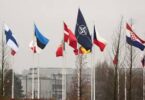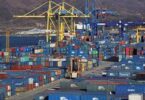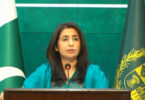UN (TASS): The participants in the high-level UN Security Council meeting on maritime security spoke in favor of strengthening the fight against piracy and strengthening cooperation in the fight against attempts to use sea routes to commit crimes. Representatives of Western countries tried to raise the topic of the situation in the South China and Black Seas, as well as attacks on the Mercer Street tanker in the Arabian Sea, but did not find a response.
Russian initiative
Russian President Vladimir Putin, who took part in the meeting, suggested thinking about uniting the efforts of different countries under the auspices of the UN in the fight against sea piracy. In itself, the speech of the Russian leader at the UN Security Council was an extraordinary event. High-level meetings are held two or three times a month, but the leaders of the countries still rarely speak at them and, as a rule, if this country presides over the UN Security Council. In August, India is acting in this capacity, whose Prime Minister Narendra Modi chaired the meeting.
Putin pointed out in his speech that due to the increase in the number of pirate attacks “there is a question of uniting under the auspices of the UN the power potential of the special services and the corresponding armed contingents of all interested states.” According to the president, the structure he proposed could rely on the support of the UN member states and actively involve experts, representatives of civil society, research circles and even private business in its work. “We hope that our partners will constructively consider the Russian proposal,” he said.
The head of state noted that Russia is ready to share its experience in anti-terrorist operations, crime prevention and prevention, identification and neutralization of bandit formations, including in maritime areas. What will be the response to this initiative will become known later. The format of the video presentations limits the possibility of conducting discussions, so that in most cases the participants do not react to the words of other speakers, but read out their prepared speeches.
American accusations
The meeting took place against the backdrop of the incident with the tanker Mercer Street, which was attacked on June 29 in the Gulf of Aden. The US and UK are confident that Iran is behind the incident. A high-level UN Security Council meeting could be a convenient opportunity for Western countries to take the discussion of this story to a new level, especially since the list of speakers from Western countries pushed to such conclusions – US Secretary of State Anthony Blinken, French Defense Minister Jean-Yves Le Drian, British Defense Secretary Ben Wallace.
Blinken really spoke out on this issue, and at the same time mentioned other problematic, from the point of view of Washington, areas of the world’s oceans. The secretary stressed that the United States is confident in Iran’s responsibility for the attack on the Mercer Street tanker. He also pointed out that the United States considers the situation in the South China Sea “its business”, and also said that Washington is observing aggressive actions against Ukraine in the Black Sea. Blinken’s British and French colleagues did not focus on the tanker issue.
Western countries will most likely continue to raise the incident with the tanker in the UN Security Council, but a high-level meeting in the format of a videoconference, moreover, being held completely in open mode, is not the best option for this. The discussion on this topic is likely to be held “behind closed doors” until any result is achieved, as was the case last Friday.
Blinken’s accusations about the South China Sea, where China allegedly impedes shipping, were rejected by Dai Bing, who spoke later.
Joint statement
In the statement by the chairman of the UN Security Council, which is issued on behalf of the entire Security Council, the situation with the tanker Mercer Street was not mentioned, as well as the Black and South China Seas. The document emphasized the need to comply with the norms of international maritime law without specifying any specific situations, to combat piracy, drug trafficking and other forms of organized crime at sea.
“The Security Council recognizes the importance of strengthening international and regional cooperation to counter threats to maritime security. In this regard, the Security Council welcomes the efforts of regional and subregional organizations and individual countries to strengthen maritime security, including the exchange of information on these issues,” the document says. …
The statement also says that the UN Security Council members “recognize the need to strengthen the capacity of member countries, based on their requests, to take the necessary measures against transnational criminal gangs at sea, and invites member countries to share relevant experiences.”
The high-level meeting basically met expectations – it became an occasion to draw attention to an important global long-term problem. As noted at the UN, only attacks by pirate groups in the Gulf of Aden cause annual damage of about $ 800 million acute current problems.






